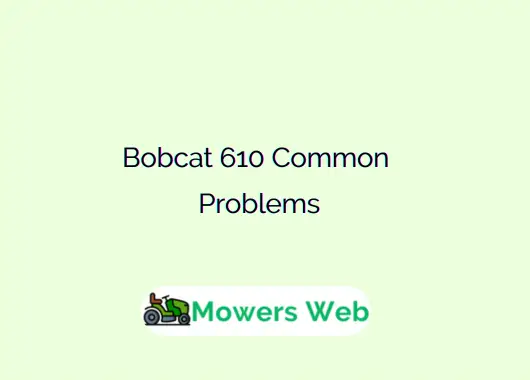In this post guide, we’ll explore seven common Kubota zero-turn mower problems, their causes, and practical solutions to keep your mower running smoothly. Let’s jump in.
Kubota Zero Turn Mower Problems
1. Uneven Cutting and Streaking
One of the most frequently reported issues with Kubota zero-turn mowers is uneven cutting or streaking, where strips of uncut grass are left behind. This can result from dull or damaged blades, an unbalanced mower deck, or improper tire pressure. Wet grass or debris buildup under the deck can also clog the blades, preventing a clean cut.
Solution: Regularly inspect and sharpen the mower blades, ideally at the start of each mowing season. If blades are bent or damaged, replace them. Ensure the mower deck is level by checking the manufacturer’s manual for adjustment instructions.
Verify that tire pressure is consistent across all wheels, as low pressure can tilt the deck and cause uneven cuts. Clean the underside of the deck after each use to prevent grass buildup, especially when mowing wet grass.
Related Common Kubota GR2120 Problems With Solutions
2. Engine Starting Problems
Difficulty starting the mower is a common complaint, often linked to fuel-related issues or electrical problems. A low fuel level, stale fuel, or a clogged fuel system can prevent the engine from starting. Additionally, a faulty key switch, low battery charge, or blown fuses can cause starting issues.
Solution: Check the fuel tank and ensure it’s filled with fresh gasoline, as fuel older than 30 days can degrade and cause starting problems. Drain stale fuel and replace it with high-quality fuel recommended by Kubota. Inspect the fuel filter and replace it if it is clogged.
Verify the key switch is in the “On” position and check all fuses, particularly the starter relay fuse, for damage. Charge or replace the battery if it’s low, and clean or replace the air filter if it’s dirty.
Related 5 Common Kubota BX23s Problems (With Solutions)
3. Engine Overheating
Overheating is another issue that can affect Kubota zero-turn mowers, particularly models like the Z724 and Z726X. This is often caused by blocked cooling fins, a dirty engine, or low oil levels. Grass clippings or debris clogging the air intakes can also prevent proper cooling.
Solution: Clean the engine and cooling fins regularly to ensure proper airflow. Remove the mower casing to clear debris from the air intakes and the deck. Check the oil level before each use and top it up or change it as needed, following Kubota’s recommendation of changing oil every 100 hours or annually.
Suppose the radiator is leaking, repair or replace it. Regular maintenance of the cooling system will prevent overheating and potential engine damage.
Related 5 Common Kubota ZD1511 Problems(With Solutions)
4. Hydrostatic Transmission Issues
Hydrostatic transmission problems are common in zero-turn mowers, including Kubota models. Symptoms include the mower failing to move despite the engine running, sluggish performance, or difficulty disengaging the transmission for free-wheeling.
These issues can stem from low hydraulic fluid, worn pump belts, or air in the hydraulic system.
Solution: Check the hydraulic fluid level and top it up if low, using the fluid specified by Kubota. Replace the pump belt if it appears cracked or worn. If the drive release lever is not in the operating position, adjust it accordingly.
For persistent issues, such as air in the system or a faulty transmission, consult a professional technician, as these components are complex and not user-serviceable.
Related Common Kubota Hydraulic Valve Problems (With Solutions)
5. Shutting Off During Operation
Some users report their Kubota zero-turn mowers shutting off unexpectedly after running for a period, as seen with models like the Z121s and ZG23. This can be caused by a clogged fuel system, a faulty fuel solenoid, or issues with safety switches. Sediments in the fuel tank or a blocked pick-up tube can also restrict fuel flow.
Solution: Inspect the fuel tank for sediments and clean it if necessary. Remove and check the fuel pick-up tube and cut-off valve for blockages, ensuring you can blow air through them freely.
Test the fuel solenoid by removing it from the carburetor and cutting off the tip to eliminate it as a cause. Check all safety switches and their connections for wear or loose wiring. If the issue persists, consult a mechanic to diagnose potential carburetor or coil problems.
Related Kubota RTV-X1100C Problems(7 Quick Ways To Fix)
6. Hydraulic Transmission Fan Damage
A specific issue with models like the ZD1211 is damage to the plastic hydrostatic transmission (HST) fan, often caused by sticks or debris breaking the blades. This can lead to overheating of the transmission and reduced performance.
Solution: Inspect the HST fan after each mowing session, especially in areas with debris like sticks. If the fan blades are damaged, replace the fan, though this can be costly at a Kubota dealer.
Some users suggest aftermarket fixes, such as adding a protective plate to shield the fan. Regular cleaning of the mower deck can also reduce debris accumulation and protect the fan.
7. Excessive Noise or Vibration
Excessive noise or vibration during operation can indicate loose components, such as bolts or pulleys, or worn-out blades. A faulty electrical clutch or spindle issues can also contribute to this problem.
Solution: Tighten all nuts, bolts, and belts to eliminate rattling. Inspect the blades for damage or dullness and replace or sharpen them as needed. Check the spindle and pulley for wear and replace any faulty components.
Cleaning the deck to remove grass buildup can also reduce noise caused by restricted airflow. If vibrations persist, have a professional inspect the electrical clutch.
Related 15 Common Kubota Z726X Problems(With Solutions)
Final Thoughts
Kubota zero-turn mowers are reliable and powerful machines, but they are not immune to mechanical issues. Regular maintenance, such as checking fuel quality, sharpening blades, cleaning the deck, and monitoring fluid levels, can prevent many of these problems.
For complex issues like transmission or electrical faults, seeking professional help is recommended to avoid further damage.




